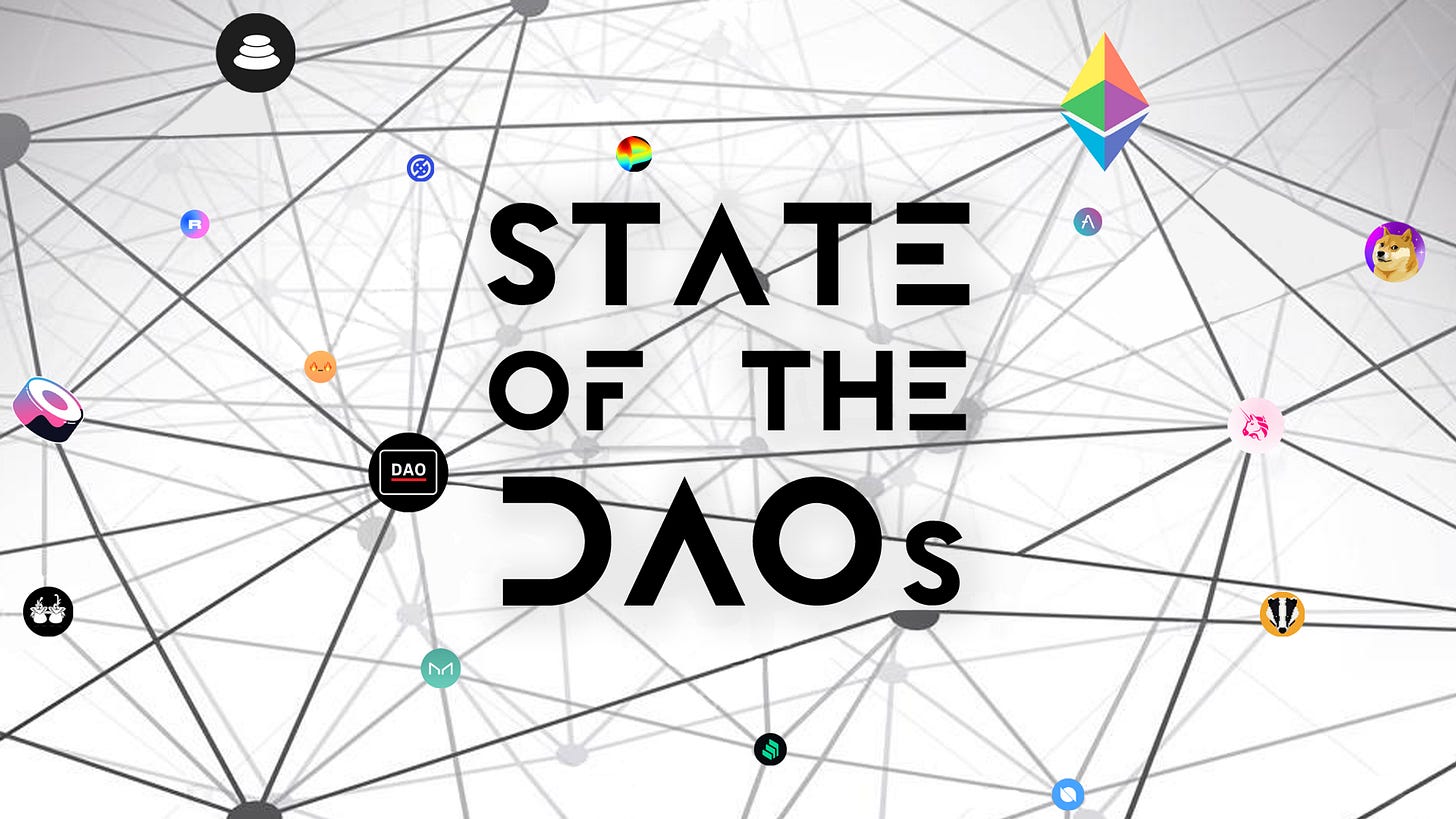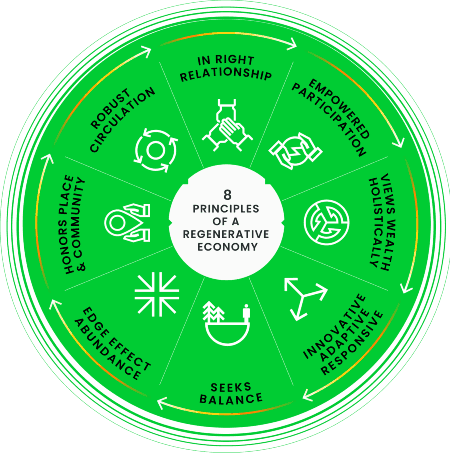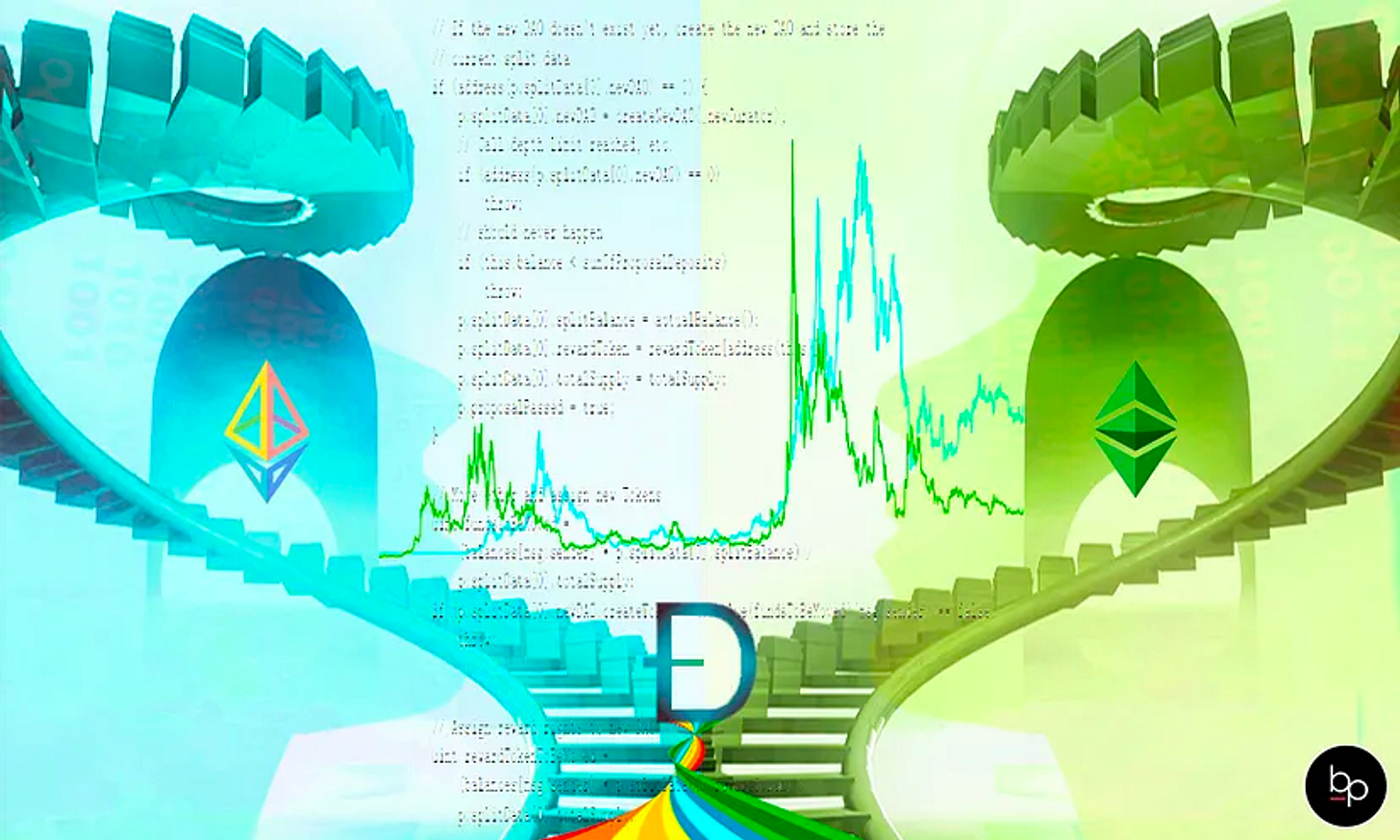ReFi Rewards Balance and Resilience | State of the DAOs
You're reading State of the DAOs, the high-signal low-noise newsletter for understanding DAOs.
‘There’s a DAO for that’ — it’s true: DAOs can be formed for just about any cause or common interest, and one of the strongest and most urgent common interests around the globe is to initiate a paradigm shift in attitudes to economic growth. In this edition, read about the core concepts underpinning ReFi (regenerative finance) and explore its potential to reshape the financial landscape, as it aims to prioritize the health and resilience of ecosystems, societies, and the environment over monetary gain.
ReFi DAOs and project teams are at the forefront of these efforts, driving positive social and environmental impact through innovative financial models that leverage blockchain technology effectively. Speaking of positive impact, Gitcoin Grants has just launched Round 19 of the innovative public goods donation model which directs matching funds to those projects that receive support from many donors. BanklessDAO and various BanklessDAO project teams are again participating in the Web3 Community and Education round — we’d love to have your support.
We also feature insights from the DAO ecosystem, including articles on AI DAOs, internet-native companies, The DAO hack, and the power of real-world connections in the digital age.
We hope you find this edition informative and inspiring as we explore ReFi and its roots in Fullerton’s ‘Eight Principles of Regenerative Economics’. Thank you for joining us on this journey through the State of the DAOs.
Contributors: BanklessDAO Writers Guild (Boluwatife, Tonytad, angelspeaks, Quilia, Vi-Fi, trewkat, siddhearta, HiroKennelly)
This is an official newsletter of Bankless Publishing, a BanklessDAO-affiliated project. Please subscribe and share to help us grow our audience as we fulfill our mission to build user-friendly crypto onramps.
ReFi Rewards Balance and Resilience
Author: Boluwatife

The term ReFi was born out of a concept that an economist named John Fullerton put forward in 2015, a concept he called regenerative capitalism. According to Fullerton, there are eight principles which underpin an economic and financial system capable of generating shared prosperity for all. As you read further about ReFi, you will see the relationship between these principles and the ReFi ecosystem we have today.
Although the idea behind ReFi originated in 2015, the name only followed on the heels of its predecessor DeFi, which originated in the crypto space in 2018. Decentralized finance, or DeFi, is a movement that seeks to offer more accessible and transparent financial services using decentralized, permissionless, blockchain networks. DeFi initiatives strive to build a novel financial system that isn't dependent on traditional financial institutions and can operate around the clock without requiring intermediaries.
ReFi — or regenerative finance — is the next evolution of DeFi.
Why ReFi?
ReFi is a financial paradigm that places a higher value on the health and resilience of ecosystems, societies, and the environment than it does on monetary gain. The goal is to design economic models that support sustainable development and help underserved populations while fostering social and environmental impact. ReFi is a departure from traditional financial structures that have been criticized for putting short-term profit over long-term sustainability.
Currently, our planet is faced with the crises of climate change and biodiversity loss. It seems that the human mind is forcing away the fact that we only have one earth, and the effects of this crisis are not to be taken lightly. Luckily some groups of people and institutions are looking at alternative models and incentive structures to solve this planetary crisis.
No doubt the words of Albert Einstein resonate with proponents of ReFi:
“We can't solve problems by using the same kind of thinking we used when we created them."
ReFi embodies a potential advancement of technology, organizational structures, and human awareness. To fix the Earth's current crisis we have to redesign financial incentives and align them with the pillars of ReFi which are:
Ensuring climate stability by reducing and eliminating greenhouse gas emissions primarily through carbon markets.
Restoring ecosystems by promoting biological diversity, which can be exchanged with carbon market infrastructure.
Instituting social justice by creating regenerative local economies that are grounded in communities of care.
ReFi’s Core Values
The core values of ReFi are mapped after Fullerton’s Eight Principles of Regenerative Economics:
In right relationship: this gives priority to healthy financial ties between all parties, avoiding imbalanced ties that disturb the financial ecosystem.
Empowered participation: Provision of an ecosystem that allows for empowered involvement so that all parties may interact, negotiate their demands, and advance the health and well-being of bigger systems.
Views wealth holistically: By defining wealth as a state that must be managed for the benefit of the whole, wealth can be seen more broadly than just the sum of the numbers in a bank account or cryptocurrency wallet.
Innovative, adaptive, and responsive: To exist in a hostile environment and guarantee a free flow of capital, services must be innovative, flexible, and responsive.
Seeks balance: keep all parties in a healthy balance, enabling the growth of human, social, natural, and physical capital.
Edge Effect Abundance: this encourages innovation and abundance at the system's margins to provide new opportunities and benefits for the community and environment.
Honors Place and Community: Create thriving, resilient communities that are distinctive to their history and location in order to sustain regenerative finance.
Robust circulation: ensure a healthy financial circuit that allows financial and human entities to develop.
ReFi projects prioritize social impact, equity, and sustainability. To help achieve these goals, smart contracts are used because they automate financial transactions and eliminate the need for intermediaries, which lowers costs and increases transparency.
One of the primary characteristics of the ReFi ecosystem is its emphasis on sustainability. The ecosystem's projects prioritize using clean energy to power their operations, such as solar and wind power, which reduces their carbon footprint and promotes environmental responsibility.
Another feature is the ReFi ecosystem's commitment to positive social impact. This is accomplished through a variety of programs, including financial assistance to underserved areas, investments in renewable energy infrastructure, and funding for social enterprises and impact-driven projects.
Building a Sustainable Future
A vanguard of mission-driven DAOs aims to propel ReFi from concept to widespread implementation:
Regen Network supports education and research on ReFi models through grants and literature synthesis.
Commons Stack develops frameworks and workflows for DAOs to easily fund public goods like ecological restoration. Its life fund provides grants for preserving biodiversity.
ReFi DAO supports local ecosystems in global south countries using crypto tools to finance sustainability.
Klima DAO has created a tokenized carbon offset scheme supporting the transparent removal of over 17 million tons of CO2 so far. This is one of the most explosive ReFi projects so far.
Several blockchain protocols and standards provide the foundation for decentralized ReFi applications:
Climate Chain Coalition develops the Regen Ledger, an open standard for registries tracking carbon mitigation outcomes.
Moss Earth Protocol issues tokenized carbon credits (MCO2) driving a marketplace for nature-based carbon sequestration.
Polymesh enables legally compliant tokenized securities, used in regulated ReFi investment offerings.
Geo Web's Proof of Location verifies conservation sites on-chain, enabling precise regenerative project mapping.
Several for-profit startups serve as bridges into mainstream finance, developing crypto investment vehicles that heal ecosystems:
Nori offers a regulated, tokenized voluntary carbon credits marketplace enabling corporate offset purchasing.
EcoCoin converts plastic waste into tokens via drop-off kiosks, funding local sustainability efforts.
These platforms and protocols are just the tip of the iceberg. There are multiple organizations already doing the good work of pushing the ReFi movement forward.
The Future of ReFi
ReFi has recently shifted from a fringe concept to a growing movement. The existential urgency of ecological crises alongside crypto's newfound mainstream legitimacy has accelerated this trend. Still, realizing ReFi’s full potential requires bridging gaps between the decentralized ethos of DAOs and startups with incumbent policy and finance.
Near term, educating regulators and traditional investors can expand ReFi’s viability. Long term, decentralized governance and transparency intrinsically align ReFi with the needs of communities and environments.
Shifting investment's incentive structure toward ecological wholeness and social equity is imperative if we are to leave an inhabitable world for our children.
ReFi offers a path to fund this transition and empower local stakeholders. Through tireless work from its diverse and determined advocates, ReFi’s reach grows daily. Keep an eye out for the newly introduced Climate Solutions Round in the current Gitcoin Grants 19 to support project teams who are passionate about building in the ReFi space.
Recently, ReFi Week 2023 showcased more of this innovation. More than 40 ReFi leaders across projects like Regens Unite, ReFi Lisboa, Silvi Protocol, and Impact Market gathered for a week of collaboration and creation.
Activities included a mass tree planting of over 800 trees tracked via leading ReFi protocols like Silvi and Open Forest.

Events like ReFi Week highlight the momentum toward leveraging crypto to incentivize low-carbon lifestyles and fund climate solutions. With gamification and personal carbon tracking also emerging, the future of ReFi looks promising.
Ecosystem Takes
🔥 and 🧊 insights from across the DAO ecosystem
AI DAOs Series
Author: Trent McConaghy
🔑 Insights: This series features a collection of the key articles written by the author about AI DAOs and humanity.
Blockchain For Artificial intelligence
AI DAOs, and Three Paths to Get There
Wild, Wooly AI DAOs
The AI Existential threat: Reflections of a Recovering Bio-Narcissist
The Bandwidth++ Scenario
Nature 2.0: The Cradle of Civilization Gets an Upgrade.
Making Companies First Class Citizens of the Internet Economy
Author: arthaud.eth
🔑 Insights: The author writes that an Internet Native Company (INC) is a “for-profit organisation that is created, operated and governed on-chain”. INCs create a seamless, automatic and programmatic way for governments and digital economic agents to interact.
The imperfect binding of the offchain and onchain world makes hybrid companies second-class citizens of the internet economy.
INCs will become first-class citizens of the Internet economy because they operate onchain, grant legal personality to smart contracts, and recognise code is law.
The source of economic production is shifting from labour and capital to technology.
Not Forking Around: The DAO Hack
Author: trewkat
🔑 Insights: Blockchain immutability, grounded in distributed nodes and cryptographic links, is a foundational principle. However, pivotal events, such as The DAO hack in 2016, led to a critical decision: a hard fork in Ethereum, resulting in the creation of two divergent chains — Ethereum (ETH) and Ethereum Classic (ETC).
The Ethereum community faced a dilemma when a significant ‘hack’ exploited The DAO's smart contract, prompting a debate on whether to maintain blockchain immutability or reverse the theft through a fundamental protocol change.
The Ethereum Foundation's response was to initiate a hard fork, leading to two separate blockchains (ETH and ETC).
The hard fork exposed ideological differences within the community, with Ethereum Classic emphasizing the preservation of "Code is Law."
The Power of Real-World Connections in the Digital Age
Author: Puncar
🔑 Insights: In this online-oriented world, the need to foster human connection through in-person interactions becomes significant. How To DAO (H2D) stands at the forefront of this movement and aims at educating and connecting people in the world of web3.
Through the H2D initiative, conferences have been held to bring founders, builders, and global web3 thought leaders and audiences together. These events help showcase the possibilities of blockchain and bring the technology closer to people.
Face-to-face interactions foster trust, understanding, and collaboration. It also gives people the opportunity to learn from each other and connect on a deeper level.
The web3 landscape spans diverse domains, and incredible breakthroughs emerge when various industries collaborate and exchange ideas. Engaging with diverse individuals at in-person events opens doors to exciting opportunities and connects you with people who share a common interest.
There’s room for everyone in web3, and with the right connections you can discover your space and start thriving.
🍏 Gitcoin Grants 19

Gitcoin Grants aims to foster innovation in the web3 space while aligning with the principles of decentralization and community empowerment. The broader vision for GG19 is to maintain the essence of Gitcoin Grants amid a shift towards a suite of decentralized products, ensuring the community ethos remains vibrant.
As usual, there is a strong showing from BanklessDAO and various BanklessDAO project teams in the Web3 Community and Education round. This round will run on the Public Goods Network.
If you need more info on getting your Gitcoin Passport ready, revisit this Bankless Publishing X thread, and get ready for a good grants round!









